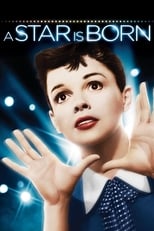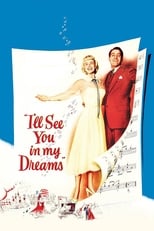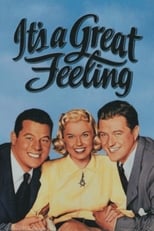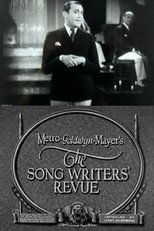

Ray Heindorf
Born: August 25, 1908
Died: February 3, 1980
in Haverstraw, New York, USA
Died: February 3, 1980
in Haverstraw, New York, USA
From Wikipedia, the free encyclopedia
Ray Heindorf (August 25, 1908 – February 3, 1980) was an American songwriter, composer, conductor, and arranger.
Born in Haverstraw, New York, Heindorf worked as a pianist in a movie house in Mechanicville in his early teens. In 1928, he moved to New York City, where he worked as a musical arranger before heading to Hollywood. He gained his first job as an orchestrator at MGM, where he worked on Hollywood Revue of 1929, and subsequently went on the road playing piano for Lupe Vélez.
After completing this engagement, he joined Warner Bros., composing and/or arranging and conducting music exclusively for the studio for nearly forty years. Heindorf, along with Georgie Stoll at MGM, were jazz aficionados well known in the black entertainment community for employing minority musicians in their studio music departments.
He undertook the musical direction of Judy Garland's comeback film A Star is Born (1954) and made a cameo appearance as himself in the premiere party sequence where Jack Carson's character congratulates him on a great score.
Among Heindorf's other screen credits are 42nd Street, Gold Diggers of 1935, The Great Lie, Knute Rockne All American, Kings Row, Night and Day, Tea for Two, A Streetcar Named Desire, The Jazz Singer, No Time for Sergeants, The Helen Morgan Story, Marjorie Morningstar, Damn Yankees, Auntie Mame, Finian's Rainbow, and his final musical for Jack L. Warner, 1776.
Between 1943 and 1969 he was nominated for eighteen Academy Awards, 17 nominations for Best Score and 1 nomination for Best Song. Heindorf won three, in the category of Best Score of a Musical, for Yankee Doodle Dandy, This is the Army, and The Music Man. His wins for the former two films made him the first to accomplish consecutive wins in a musical category.
Heindorf died in Tarzana, California, aged 71, and reputedly was buried with his favorite conducting baton.
Ray Heindorf (August 25, 1908 – February 3, 1980) was an American songwriter, composer, conductor, and arranger.
Born in Haverstraw, New York, Heindorf worked as a pianist in a movie house in Mechanicville in his early teens. In 1928, he moved to New York City, where he worked as a musical arranger before heading to Hollywood. He gained his first job as an orchestrator at MGM, where he worked on Hollywood Revue of 1929, and subsequently went on the road playing piano for Lupe Vélez.
After completing this engagement, he joined Warner Bros., composing and/or arranging and conducting music exclusively for the studio for nearly forty years. Heindorf, along with Georgie Stoll at MGM, were jazz aficionados well known in the black entertainment community for employing minority musicians in their studio music departments.
He undertook the musical direction of Judy Garland's comeback film A Star is Born (1954) and made a cameo appearance as himself in the premiere party sequence where Jack Carson's character congratulates him on a great score.
Among Heindorf's other screen credits are 42nd Street, Gold Diggers of 1935, The Great Lie, Knute Rockne All American, Kings Row, Night and Day, Tea for Two, A Streetcar Named Desire, The Jazz Singer, No Time for Sergeants, The Helen Morgan Story, Marjorie Morningstar, Damn Yankees, Auntie Mame, Finian's Rainbow, and his final musical for Jack L. Warner, 1776.
Between 1943 and 1969 he was nominated for eighteen Academy Awards, 17 nominations for Best Score and 1 nomination for Best Song. Heindorf won three, in the category of Best Score of a Musical, for Yankee Doodle Dandy, This is the Army, and The Music Man. His wins for the former two films made him the first to accomplish consecutive wins in a musical category.
Heindorf died in Tarzana, California, aged 71, and reputedly was buried with his favorite conducting baton.
Movies for Ray Heindorf...

Title: A Star Is Born
Character: Movie Premiere Attendee (uncredited)
Released: October 1, 1954
Type: Movie
A movie star helps a young singer-actress find fame, even as age and alcoholism send his own career into a downward spiral.


Title: I'll See You in My Dreams
Character: Orchestra Leader at Kahn Benefit (uncredited)
Released: December 6, 1951
Type: Movie
Songwriter Gus Kahn fights to make his name, then has to fight again to survive the Depression.


Title: The Screen Director
Character: Self (uncredited)
Released: March 12, 1951
Type: Movie
A documentary short film depicting the work of the motion picture director. An anonymous director is shown preparing the various aspects of a film for production, meeting with the writer and producer, approving wardrobe and set design, rehearsing scenes with the actors and camera crew, shooting the scenes, watching dailies, working with the editor and composer, and attending the first preview. Then a number of real directors are shown in archive footage (as well as a predominance of staged 'archive' footage) working with actors and crew.


Title: It's a Great Feeling
Character: Ray Heindorf (uncredited)
Released: August 1, 1949
Type: Movie
A waitress at the Warner Brothers commissary is anxious to break into pictures. She thinks her big break may have arrived when actors Jack Carson and Dennis Morgan agree to help her.


Title: The Song Writers' Revue
Character: Himself
Released: November 27, 1929
Type: Movie
This short showcases composers and lyricists of songs that are now considered standards of American popular music. For several of these song writers, this is their only known appearance in a theatrically released film.
